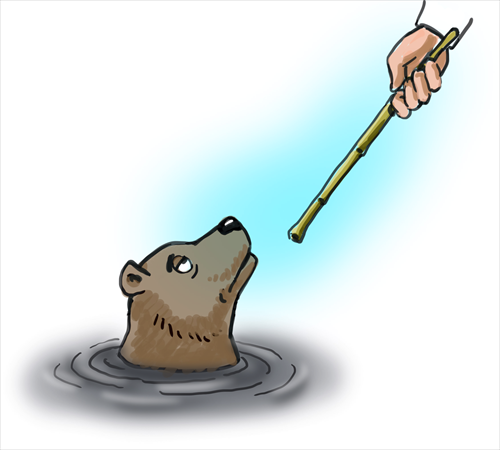Mutual aid may help support Russia through ruble crisis

Illustration: Liu Rui/GT
The recent plunge of the Russian ruble came as a result of multiple combined factors. In practice, the ruble's value is correlated with the price of crude oil, making it a risky currency. The value of ruble is directly proportional to oil prices. As international oil prices have slumped since July, the ruble has witnessed an even steeper drop.
Besides, the ruble is a freely tradable currency and hence vulnerable to international venture capital. The ruble became the most volatile of the 41 major currencies tracked by Bloomberg in 2014.
The US winding down its quantitative easing policy (QE) since 2013 pushed up the US Dollar Index and prompted the slide of oil prices, hitting emerging markets.
This QE withdrawal has two effects. It drove down bulk commodity prices and prompted the reverse flow of capital from emerging markets to developed countries.
In the past one year and a half, 90 percent of emerging economies have been growing more slowly than previously. This may be a game between developed and emerging economies in a fresh round of economic cycle and Russia is only one of the targets hit.
Moreover, multiple rounds of sanctions imposed by the US and Europe on Russia due to the Ukraine crisis have created negative effects. They have severely shaken the confidence of investors and prompted an increasing tendency to avoid risks. The tremendous capital flight and sizable shrinkage in the stock market has accelerated currency deflation.
After the large-scale speculative sell-off of the ruble in foreign exchange markets, the Russian government was compelled to bailout, using its foreign exchange reserve. Its sovereign debt rating was downgraded, beginning a vicious cycle.
Russia's fundamental problems lie in its economic structure and growth mode. Its development pattern supported by the export of raw materials can no longer be sustained. The Russian economy entered a period of slow growth in 2013. But due to the worsening problems of its structures and the decline in external demand, there is limited room for policy maneuvers.
The ruble's value against the renminbi also fell sharply, which had an extensive impact on Chinese enterprises in Russia. There was a significant drop in the sale of Chinese auto companies and heavy losses for Chinese businesses exporting light textiles and home appliances to Russia. Those ongoing projects priced in dollars may face the possibility that the Russian side doesn't have enough foreign currency for payments.
So far the decline in oil prices hasn't hit rock bottom and the result of the ruble bailout has to be closely watched.
It's an acute question for decision-makers as to whether China should offer help if Russia faces financial difficulties. With regard to the broad vision and China's long-term development, China and Russia supporting each other will be normal for a long period.
Both sides have prioritized the development of bilateral relations as a strategic choice for their diplomacy and consider each other a supplier of important opportunities and an important partner.
China needs Russia's support and cooperation in advancing reform of the international system and global governance and implementing major strategies like the "One Belt and One Road" initiative. As emerging economies are faced with common challenges and opportunities currently, helping Russia is indeed helping ourselves.
China has to give a helping hand to Russia whenever needed, whether it's for political, moral, strategic and economic considerations.
It's necessary to follow the principle of achieving mutually beneficial, win-win results.
In addition, China can offer aid through multilateral mechanisms like BRICS and the Shanghai Cooperation Organization in various ways including loans, large project cooperation and investment in Russian infrastructure.
The author is a research fellow with the Institute of Russian, Eastern European, Central Asian Studies at the Chinese Academy of Social Sciences. opinion@globaltimes.com.cn